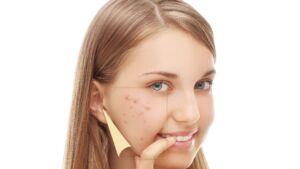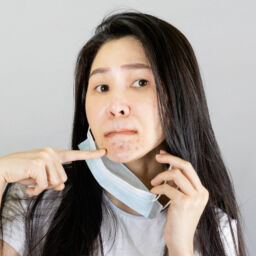Why do I still have acne in my late 20s?
At its root, adult acne is caused by the same things that cause teen acne: excess skin oil and bacteria. Any changes in hormones, including those brought on by pregnancy and menstruation, can trigger excess oil. Women who smoke also seem to be more prone to acne.
Acne tends to run in families, so if a parent had adult acne, you’re at higher risk. People can get acne into their 40s and beyond.
I wash a lot but still get blackheads. Why?
Washing your skin can’t get rid of blackheads or acne. Why? Blackheads form below the skin’s surface, when oil, also called sebum, reacts with air in a partially clogged pore. When the pore is totally blocked, you get a whitehead.
Wash your face twice a day and after sweating, using a mild cleanser and warm water — not hot water. Do not scrub your skin as that can worsen acne.
Do birth control pills cause or cure acne?
Birth control pills may help some women control acne. The hormones in birth control pills can help block androgen hormones. Androgen puts oil glands into overdrive. Some birth control pills, though, can make acne worse. So even if you take birth control pills, you’ll still need a good acne skin care routine.
Could my makeup cause my acne?
Yes. In fact, anything you put on your face has the potential to clog pores. Look for oil-free makeup, sunscreens, and other skin products. Non-comedogenic and nonacnegenic products can be better for acne-prone skin. Adult Acne: Popular Questions and Answers
You might also try using powder cosmetics instead of cream foundations. If you do want to use foundation, some dermatologists recommend oil-free liquid silicone matte foundations, such as those containing dimethicone or cyclomethicone.
My job is stressful. Is that a factor in acne?
Stress is not considered a main cause of acne. More often, your acne may increase your stress levels. Effective acne treatment may actually help reduce your stress.
However, in some people, stress can worsen acne. If you think stress triggers outbreaks, simple techniques, such as deep breathing exercises or even meditation, can ease stress.
What’s the truth about chocolate and acne?
There’s no scientific proof that eating chocolate, sugar, or greasy food causes acne. However, if it seems that certain foods trigger breakouts, avoid them.
Sugary or greasy foods hinder your health in other ways, contributing to diabetes and heart disease. Reach for fresh food for better overall health.
What is deep-cyst acne?
Deep-cyst acne can be painful and frustrating to treat. Follicles are clogged deep beneath the skin’s surface. Your doctor may choose to treat this severe form of acne with antibiotic pills for a short time. Injectable corticosteroids may calm the inflammation. Topical creams with retinoids may also help.
Never pick, poke, or pop lesions. That can worsen acne and cause scars.
Am I stuck with acne forever?
On its own, acne does seem to go away with age. According to one study, acne becomes less common after age 44. And for some women, acne ends with menopause.
Until then, fortunately, there are treatments for adult acne. Most people find a combination of products work best. Treatment takes time — usually 4 to 12 weeks — and you need to continue it for it to work.Adult Acne: Popular Questions and Answers
What’s the best way to prevent acne?
First, avoid touching your face. Touching your face can increase oiliness, irritate your skin, and encourage the growth of bacteria. Develop a hands-off policy.
Second, keep oily hair off your skin. And look for oil-free hair products. Oily hair care products can get on your face and clog pores.
Third, be gentle with your skin. Use your fingertips (not a washcloth or sponge) to wash your face with a non-abrasive cleanser. Use mild skin care products.


